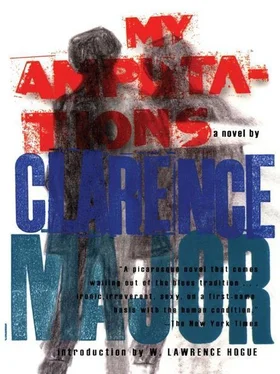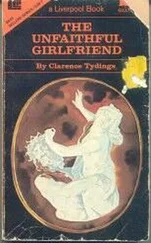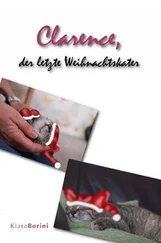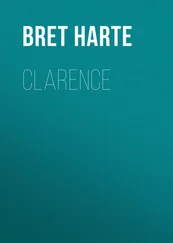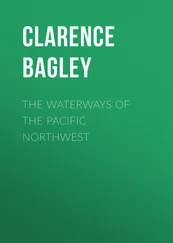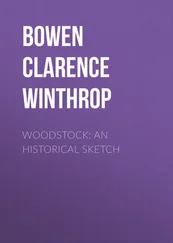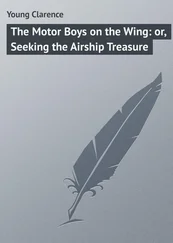Clarence Major - My Amputations
Здесь есть возможность читать онлайн «Clarence Major - My Amputations» весь текст электронной книги совершенно бесплатно (целиком полную версию без сокращений). В некоторых случаях можно слушать аудио, скачать через торрент в формате fb2 и присутствует краткое содержание. Год выпуска: 2008, Издательство: Fiction Collective 2, Жанр: Современная проза, на английском языке. Описание произведения, (предисловие) а так же отзывы посетителей доступны на портале библиотеки ЛибКат.
- Название:My Amputations
- Автор:
- Издательство:Fiction Collective 2
- Жанр:
- Год:2008
- ISBN:нет данных
- Рейтинг книги:5 / 5. Голосов: 1
-
Избранное:Добавить в избранное
- Отзывы:
-
Ваша оценка:
- 100
- 1
- 2
- 3
- 4
- 5
My Amputations: краткое содержание, описание и аннотация
Предлагаем к чтению аннотацию, описание, краткое содержание или предисловие (зависит от того, что написал сам автор книги «My Amputations»). Если вы не нашли необходимую информацию о книге — напишите в комментариях, мы постараемся отыскать её.
My Amputations — читать онлайн бесплатно полную книгу (весь текст) целиком
Ниже представлен текст книги, разбитый по страницам. Система сохранения места последней прочитанной страницы, позволяет с удобством читать онлайн бесплатно книгу «My Amputations», без необходимости каждый раз заново искать на чём Вы остановились. Поставьте закладку, и сможете в любой момент перейти на страницу, на которой закончили чтение.
Интервал:
Закладка:
Had Mason lost something in Ghana? Myth and mystery loomed in the drums, pots, musical instruments, terracotta heads, funeral relics, linguists staffs. Mason looked at a figurine with large eyes, thick nose, wide mouth: in each eye: motion of cow and countdown. A whip-lash little man with a fixed grin, Makola drove Mason through unfocused shanty town: rows of bleak, unpainted huts along the restless coast. Lean women with fat babies on their long hips; others with huge bundles on their heads, grandmothers tending community fires dancing in beds of rock. May winds came in from the Sea of Guinea bringing with them the sea-side smell of garbage. They parked. Went into a hut. This was the home of the poet, Amos Achimota. He was expecting them. Achimota led them outside. The three sat with their backs to the wall, facing the sea. The poet was an old man who began by reminding Professor Kwame Makola that his father and forefathers had been chiefs. Mason's eye was snagged several times by the up-turned tits of some young woman walking by. Usually carrying something on head-top. The poet talked of his meetings with Langston Hughes in the fifties. Was Mason impressed? Was Mason familiar with the works of Awooner, Soyinka, Senghor, Achebe, Ben-Gurion, Camera Laye, Mphahlele, Fanon? Mason lied — said yes. What did Mason think of Ghana? Did he know anything about its history? Well, yes: he had read Richard Wright's book: Black Power years before. Achimota spoke with gentle fervency. Two soldiers armed to the teeth strolled by giving them the once over. As Achimota spoke of the difficulty Ghanians had had since the fifties and before under colonialism, Mason remembered yesterday — his arrival at battered Kotoka Airport. Place filled with armed soldiers and police. Security check-points every five steps. Shirts and a suit stolen from his luggage before it even reached the baggage pick-up. Boys hassling him for money. Cab drivers — despite Professor Kwame Makola's presence — fighting over his luggage. Pathetic Makola, waving his sensitive hands in gestures of punctuation as he talked, trying to make the airport officials treat Mason as an “official visitor” and getting nowhere… and that so-called security-check just down the road from the airport where his luggage was searched again and where, finally, he and Makola were passed (and Makola saying, “Of course that was not an official security check. Outside Accra men often set up road-blocks just to, how do you say, rip off people… I hope your opinion of Ghana hasn't set yet…. ”)… And now Achimota — with yellowed rotten teeth — was laughing as he reminded Makola (with his frozen grin) that he, Makola, had spent nearly two years in prison during the regime of Akuffo. “And just for having certain friends. Hey?” “That's right, Old Man.” And was not the young Rawlings doing the best he could with an impossible situation? “Surely.” Nobody questioned the integrity of the leader of the Provisional National Defense Council. Achimota looked directly at Mason. “Are you a political poet?” Of course. But the question left Mason feeling like somebody was about to throw a ball for him to go and fetch. The old poet was happy with the response then spoke again of Langston Hughes. Hughes, he said, understood how profoundly political the life of an individual in society was. Achimota hadn't met any Afro-American poets since Hughes but considered all of them his brothers. “Welcome home, Brother.” “Thank you.” But did Mason feel at home? How black was Blackface Hermes? The old man suddenly broke open a strange piece of red fruit Mason had never seen before and passed a piece of it to Makola and the other third to Mason. The three men chewed for a few minutes in silence. It was Achimota who spoke first. “I suppose you'll be having dinner with the American ambassador?” Mason shrugged. Said he knew nothing about such a proposal. “Well, it'd be unusual if you didn't.” Achimota spat a couple of seeds into the dust. Two sullen policemen passed before them, followed by a pretty girl carrying a broken basket of rotten potatoes. Mason noticed a big man approaching. He was black. “This man you see,” said Achimota, “is the Ambassador from Nigeria. Be careful what you say. He will not be your friend.” After formalities the big man refocused on Mason. “Why are you in Ghana?” “To lecture on Monday at the University of Legon.” “And your thesis?” Was this the third degree? The thesis was art. The Nigerian Ambassador did not squat down with them in the polite manner. He said a few hesitant words to Achimota about some meeting of the cultural body then excused himself. Three little girls dressed in white dresses with white ribbons on their hair went by. Mason remembered it was Sunday. Christians? Why had the ambassador been so hostile? Had he, like the airport officials, suspected Mason of being less than straightforward? Perhaps a pusher of seedless sinsemilla or a bringer of dangerous messages? (He did not know what was in that note for Q. Tee — but, well, that was for another country.) Professor Makola stood and their host got the message. He too stood. The three men shook. “Do not judge Ghana too quickly, young man. Your ancestors came from West Africa…. ” As Mason and Makola approached the car a loud cracking sound and a scream, a cry, behind them broke across their necks. Whirling around, they saw a cop beating a young man. Even now Makola's smile did not vanish; it changed content though. It said: I trust. And in an urgent effort to distract, Makola asked, “How'd you like France? You know French people think you're stupid if you don't speak French.” Mason chuckled. They got into the old battered car and Makola drove Mason back to the American Club. “Sorry you're staying here. You won't meet the people this way. But I guess you have no choice. IHICE, right?” “Right.” Inside, the Housekeeper had a message for Professor Kwame Makola. The American Embassy's Cultural Director, Robert Astor, wanted him and Makola to come to dinner. Mason didn't know how to respond. Makola told him he'd like Astor: “He's a good man.” A nerve-winged insect buzzed around Mason's head. The lobby was cool. “I'll fetch you at four. Curfew, you know. Everything starts early.” A gust of heat came in as Makola left. Mason went to the bar. Americans were watching a variety show video-taped on the screen above the bar. The Ghanaian bartender had the inscrutable face of a chaff sifter in a harvest sacrifice. Mason shifted to the screen. There, Painted Turtle hung from the mouth of an elephant. Then Edith appeared dancing with a snake curled around her hips. An earwig crawled in beer on the bar. After a couple of shots, Mason's legs turned to spiracles. As he walked to his room, his breathing was a parachute flapping in the wind. What'd that lice-faced sifter put in that drink? A maid was making the bed. He went in the toilet and threw up dragonflies and liquified antennas. In what seemed no time at all the maid finished, he slept and woke and Makola was there. They shot a game of intense pool in the rec room before rumbling away to the party. Death bones danced on the roadside. As they arrived in the driveway, a barrage of bullets swept the facade of the house, the cars, the stone steps. Mason and Makola hit the ground. Two other cars came into the driveway. A woman screamed. Mason looked out and up and saw eight or nine fatigue-clad soldiers crouched on the ledge of the front stone wall, aiming their machine-guns at the house next door. The heat of Makola's car poured its oil and gas smells down into Mason's face. The gravel beneath his belly had the pointed sharpness of a bed of nails. His knuckles bled. A jeep came into the driveway. The man next to the driver looked official as the keeper of Solomon's stables at Megiddo. He jutted a grim jaw. He was decorated. “ Halt your fire!” he shouted to the soldiers on the wall. Risking the loss of his dignity, the official squatted a bit and beckoned to Mason and Makola. “Do come out! All is well!” He chuckled. “My men get carried away.” They crawled out. As Mason and Makola beat dust from their clothes, a white man (Astor?) opened the big door and came onto the grand porch of the mansion, and down the marble stairway. The late afternoon smelled of gunsmoke and spurge blossoms. Mason had the vague feeling he'd reached some magical frontier. The official introduced himself as General somebody. His smile was full of humidity. The white man came and shook hands with the General. They obviously knew each other. He apologized to Astor for the stray bullets. “We have the house next door surrounded. An enemy of the people, this Major Okike! My advice to you, Mister Astor, is: You and your friends stay in your big fine house. It's safe!” Another car arrived. The Africans who'd gotten out of the other two were now walking up the driveway toward them. The General shook with everybody again then leaped back into his jeep. He went away in a cloud of dust, his helmet bouncing on his big head…. The dinner-party got on: Mason was soon cornered, with scotch in hand, by Kalmoni who invited him to dinner “tomorrow night.” Mason mingled: Hourari, a silent young man who'd spent time in the states, gave him a secret handshake: it was more a slash than a thrust. Quickly, this place'd become a dungeon, hewn out of blood-slick walls. As the second round of drinks came, while the novelist, James Aburi, spoke to Mason of his two years as a political prisoner, a new round of gunfire rang out. A torpedo exploded. Janet Bu Karle, a dance teacher, joined Mason and Aburi. “Just remember we're getting there!” Mason laughed with them. Something beneath the nerve-bed and gymnastics of his sound echoed the little screech of the guinea fowl. It was not till one of the grand windows (through which the driveway could be seen) flew apart that Astor and his wife and twelve-year-old daughter quickly ushered Mason and the others down into the impenetrable coldness of their basement. It stank of fine wine and reptile skin. In the narrow passageway, the poet Jomo Danqueah joked: “All this for OAU!” On a dimly lighted wall, in passing, Mason saw this inscription: “This house constructed 1934 by MRF.” What instrument of torture was this journey? Who was Astor — really? And these others? The pellet-like bones in his skin had him now in the grip of a deep chill. At the end of this submerged level, they descended to yet another. Okoto Nsawam, a journalist, was just behind Mason. He tapped Mason's shoulder. “Welcome home, brother!” His cackle was the crunch of a fish-eating gavial.
Читать дальшеИнтервал:
Закладка:
Похожие книги на «My Amputations»
Представляем Вашему вниманию похожие книги на «My Amputations» списком для выбора. Мы отобрали схожую по названию и смыслу литературу в надежде предоставить читателям больше вариантов отыскать новые, интересные, ещё непрочитанные произведения.
Обсуждение, отзывы о книге «My Amputations» и просто собственные мнения читателей. Оставьте ваши комментарии, напишите, что Вы думаете о произведении, его смысле или главных героях. Укажите что конкретно понравилось, а что нет, и почему Вы так считаете.
